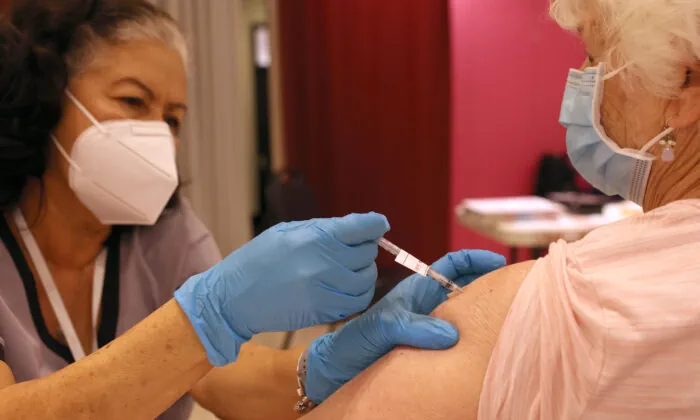
A nurse administers a COVID-19 booster vaccination at a COVID-19 vaccination clinic in San Rafael, Calif., on April 6, 2022. (Justin Sullivan/Getty Images)
The effectiveness of Moderna’s COVID-19 vaccine against infection turns negative over time, according to a new study that was funded by the vaccine maker.
The effectiveness of three doses—a primary series and a booster—against infection remained above 50 percent after 150 days against BA.1, a subvariant of the Omicron virus variant, researchers estimated.
However, against more recent strains, including the currently dominant BA.5, the effectiveness turned negative. Against BA.2, BA.4, and BA.5, the effectiveness went negative after 150 days; against BA.1.12.1, the effectiveness turned negative after 91 days.
Negative effectiveness means that a vaccinated person is more likely to contract COVID-19, the disease caused by the virus, than an unvaccinated person.
Researchers with Moderna and Kaiser Permanente, which carried out the study, also found that people who received three Moderna doses were more likely to become infected when compared to people who received just two doses.
Researchers said that they attempted to reduce potential bias by taking actions such as adjusting for comorbidities, but that some confounding may remain.
They said that some of the negative effectiveness estimates “could be due to differential risk behaviors among vaccinated and unvaccinated individuals when protection from antibodies becomes minimal.”
Hung Fu Tseng, a researcher with Kaiser Permanente Southern California and the study’s corresponding author, declined to provide evidence for the statement or otherwise comment on the negative effectiveness estimates.
“The manuscript is under review by a journal. I can’t comment on your questions now. I can, however, answer your question[s] when it is accepted,” Tseng told The Epoch Times in an email.
The study was published ahead of peer review on medRxiv, a preprint server. Researchers reached the numbers after analyzing data from Kaiser Permanente Southern California, which provides health care and insurance to millions of members.
2022.09.30.22280573v1.fullModerna officials didn’t respond to a request for comment.
While researchers did estimate that the vaccine remains protective against severe illness, they didn’t separate the effectiveness estimates by time since vaccination.
A slew of other studies and analyses have found that the effectiveness of COVID-19 vaccines turns negative over time, including a study that estimated the protection for children aged 5 to 11 turned negative after 18 or 20 weeks, and an analysis of data from a Centers for Disease Control and Prevention (CDC) testing program that estimated the shielding turned negative around six months.
Swedish researchers in September concluded that effectiveness turned negative within several months.
“Somewhat implausibly, we even observed a negative VE against Omicron infection from week 14, indicating that vaccinated individuals experienced a higher risk of infection than those unvaccinated,” they wrote in a preprint paper. “This may relate to harvesting bias in this analysis of the first event of a common outcome (as infection with Omicron is getting close to ubiquitous in many areas now). More unvaccinated individuals had already been infected, leaving a larger pool of vaccinated individuals susceptible to their first infection later by Omicron.
“As a result, a higher risk among vaccinated individuals might be observed for a limited time period.”
The CDC continues to recommend vaccination for virtually every person aged 6 months or older.

